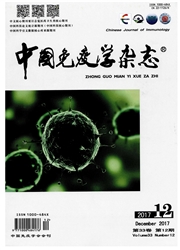

 中文摘要:
中文摘要:
目的:探讨胸腺基质淋巴细胞生成素(TSLP)对宫颈癌细胞活力的自分泌调节作用。方法:体外培养宫颈癌细胞株HeLa和CasKi,分别收集培养24、48和72小时的培养上清,ELISA法检测培养上清中TSLP的分泌水平;流式细胞术分析HeLa和CasKi细胞表面TSLP受体(TSLPR)的表达水平;再用MTT法分别检测HeLa和CasKi细胞经人重组细胞因子TSLP(1、10和100 ng/ml)处理24、48和72小时后细胞活力的水平变化。结果:HeLa和CasKi细胞均呈时间依赖性分泌TSLP(P〈0.01),且HeLa细胞在24和48小时分泌TSLP的水平高于CasKi细胞(P〈0.01或P〈0.05);HeLa和CasKi细胞TSLPR阳性表达率分别为23.61±1.30和27.07±2.13,前者低于后者(P〈0.05);此外,10或100 ng/ml TSLP作用HeLa和CasKi细胞48小时或72小时均能上调其细胞活力(P〈0.05)。结论:宫颈癌细胞可能通过TSLP自分泌作用促进自身的活力,进而利于宫颈癌细胞的生长,因而参与宫颈癌的发病和进展。
 英文摘要:
英文摘要:
Objective:To explore whether thymic stromal lymphopoietin(TSLP) regulates the viability of cervical cancer cells.Methods:We cultured HeLa and CasKi cells for 24,48 and 72 h in vitro,and collected the supernatants for analyzing the secretion of TSLP by ELISA,respectively.Flow cytometry was performed to detect the expression of TSLPR on HeLa and CasKi cells.Moreover,we used MTT assay to analyze the viability of HeLa and CasKi cells after treatment with recombinant human TSLP at different concentration(1,10 and 100 ng/ml).Results:Both HeLa and CasKi cells secreted TSLP in a time-dependent manner(P〈0.01),and the TSLP secretion level of HeLa cells was higher than that of CasKi cells at 24 and 48 h(P〈0.01 or P〈0.05).The ratio of TSLPR positive HeLa and CasKi cells was(23.61±1.30) and(27.07±2.13),respectively(P〈0.05).Furthermore,TSLP at the concentration with 10 or 100 ng/ml can promote the viability of HeLa and CasKi cells after 48 and 72 h.Conclusion:TSLP could up-regulate the viability of cervical cancer cells,and thus contributes to the growth of cervical cancer calls,which may be involved in the progression of cervical cancer.
 同期刊论文项目
同期刊论文项目
 同项目期刊论文
同项目期刊论文
 The DSC-expressed KAI1/CD82 controls the invasiveness of trophoblast cells via integrinβ1/MAPK/Erk1/
The DSC-expressed KAI1/CD82 controls the invasiveness of trophoblast cells via integrinβ1/MAPK/Erk1/ Thymic stromal lymphopoietin from trophoblasts induces dendritic cell-mediated regulatory TH2 bias i
Thymic stromal lymphopoietin from trophoblasts induces dendritic cell-mediated regulatory TH2 bias i CXCL12 controls over-invasion of trophoblasts via upregulating CD82 expression in DSCs at maternal-f
CXCL12 controls over-invasion of trophoblasts via upregulating CD82 expression in DSCs at maternal-f E-cadherin, as a negative regulator of invasive behavior of human trophoblast cells, is down-regulat
E-cadherin, as a negative regulator of invasive behavior of human trophoblast cells, is down-regulat The decidual gamma-delta T cells up-regulate the biological functions of trophoblasts via IL-10 secr
The decidual gamma-delta T cells up-regulate the biological functions of trophoblasts via IL-10 secr Characterization of natural killer cells in nonobese diabetic/severely compromised immunodeficient m
Characterization of natural killer cells in nonobese diabetic/severely compromised immunodeficient m FTY720-induced conversion of conventional Foxp3-CD4+ T cells to Foxp3+ regulatory T cells in NOD mic
FTY720-induced conversion of conventional Foxp3-CD4+ T cells to Foxp3+ regulatory T cells in NOD mic The costimulatory signal upregulation is associated with Th1 bias at the maternal-fetal interface in
The costimulatory signal upregulation is associated with Th1 bias at the maternal-fetal interface in The CD4+CD25bright regulatory T cells and CTLA-4 expression in peripheral and decidual lymphocytes a
The CD4+CD25bright regulatory T cells and CTLA-4 expression in peripheral and decidual lymphocytes a TSLP-induced placental DC activation and IL-10+ NK cell expansion: Comparative study based on BALB/c
TSLP-induced placental DC activation and IL-10+ NK cell expansion: Comparative study based on BALB/c Proteomic analysis of proteins differentially expressed in uterine lymphocytes obtained from wild-ty
Proteomic analysis of proteins differentially expressed in uterine lymphocytes obtained from wild-ty 期刊信息
期刊信息
